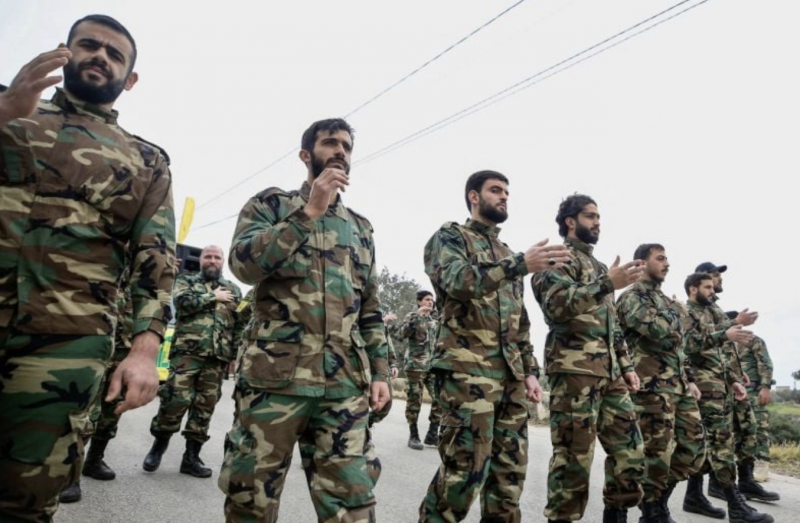
Hezbollah fighters at a funeral on Thursday in Markaba, mourning one of their comrades killed the previous day by Israel in southern Lebanon. (Credit: AFP)
Southern Lebanon has witnessed continuous exchanges of fire between Hezbollah and the Israeli army, since the war broke out in Gaza on Oct. 7, which raises concerns about a potentially destructive escalation.
Israel openly expressed its intent to use force if diplomatic efforts fail to push Hezbollah to withdraw from the border zone.
Diplomatic envoys are actively relaying threats and messages between the two sides.
The latest ultimatum from Tel Aviv gave the international community six to eight weeks to find a solution for stabilizing the Lebanese-Israeli border.
If unsuccessful, Israel warned of the possibility of a full-on war.
Action on the border
This ultimatum is closely tied to Israeli leaks reported by Western media, asserting that if Hezbollah fails to comply with the provisions of UN Security Council Resolution 1701, and move away from the border, a military plan is already in place for an operation.This includes a potential ground invasion of southern Lebanon.
Israeli officials drew parallels to the 1978 invasion, famously known as Operation Litani. During that time, Israeli forces advanced up to 40 kilometers into Lebanese territory, reaching the Litani river, to push Palestinian fighters away from the border.
Tel Aviv underscored the relevance of Resolution 1701, which concluded the July 2006 war. This resolution was adopted following escalated fighting in the conflict’s final days, notably marked by an Israeli ground incursion into the south toward Marjayoun.
Back then, Hezbollah called a ceasefire and accepted the terms outlined in the seven-point resolution.
Israel therefore believes that a military operation might serve as a means to once again exert pressure on the pro-Iranian group.
During a border area tour on Wednesday, Israel’s Chief of Staff Herzi Halevi stressed the army’s determination to safeguard the security of northern areas.
“We are not going back to the way things were before,” he said. "Regardless of the outcome, there will be a lot happening [here] in the coming year.”
Indeed, Israel’s primary concern appears to be the potential infiltration of its territory by Hezbollah fighters, especially the special forces Hajj Radwan unit, in a similar scenario to the Oct. 7 Hamas attack.
In an effort to reassure its citizens and allow their return to villages near the border, Israel is seeking guarantees.
Not only is Israel flexing its military strength, but it is also maintaining open diplomatic channels.
According to a Western diplomatic source speaking to L’Orient-Le Jour, Israel has reportedly adjusted its demands to facilitate an agreement with Hezbollah. Instead of insisting on the withdrawal of the party fighters 40 kilometers north of the Litani River, Israel is now indicating a willingness to accept a buffer zone of just 10 kilometers along its border.
Israel is unpredictable
Meanwhile, Hezbollah appears unmoved and perceives Israel’s threats s a tactical move to bolster its position in negotiations.
“If the Israelis were to launch a large-scale operation in Lebanon, they would be surprised by the scale of the strikes and the losses they would suffer,” a source close to Hezbollah told L’Orient-Le Jour on condition of anonymity, due to the sensitivity of the issue.
According to a reliable political source, French Foreign Minister Catherine Colonna meeting with Parliament Speaker Nabih Berri in Beirut, is part of ongoing discussions with the party.
During the meeting, Colonna told Berri that both Lebanon and Israel had accepted UN Resolution 1701 in 2006, emphasizing that there was, therefore, no reason not to comply with it.
“Berri did not make any promises, but did not close the door on talks,” said the same source.
Berri emphasized that Hezbollah is not actively pursuing war and has no intention of taking actions to provoke an escalation on its own. He reiterated that, once the hostilities in Gaza come to an end, the situation in the south would revert to the status quo that had prevailed since August 2006 until Oct. 7, 2023.
However, this response does not appear to satisfy the international community, especially the United States and France. They aim to disentangle the Lebanese front from the conflict in the Palestinian enclave, anticipating a prolonged war and expressing concern that Lebanon cannot endure this situation indefinitely.
Both the US and France continue to call for the implementation of Resolution 1701 and a substantial deployment of the Lebanese army and the United Nations Interim Force in Lebanon (UNIFIL) south of the Litani River, where Hezbollah would at least have withdrawn its heaviest weapons.
The international community is concerned that Israel, feeling cornered and increasingly unpredictable, might instigate a destructive escalation.
This concern is heightened by the fact that even the opposition, led by former Prime Minister Yair Lapid, does not hold back in criticizing the current head of government, Benjamin Netanyahu. Lapid daccused him of incompetence in dealing with both Hamas and Hezbollah, asserting that there exists a plan to neutralize these threats.
On the other hand, supporters of the Likud party argue that Lapid succumbed to pressure and threats of bombing from Hezbollah when he agreed to sign the maritime agreement with Lebanon in October 2022.
This article was originally in L'Orient-Le Jour. Translated by Sahar Ghoussoub.